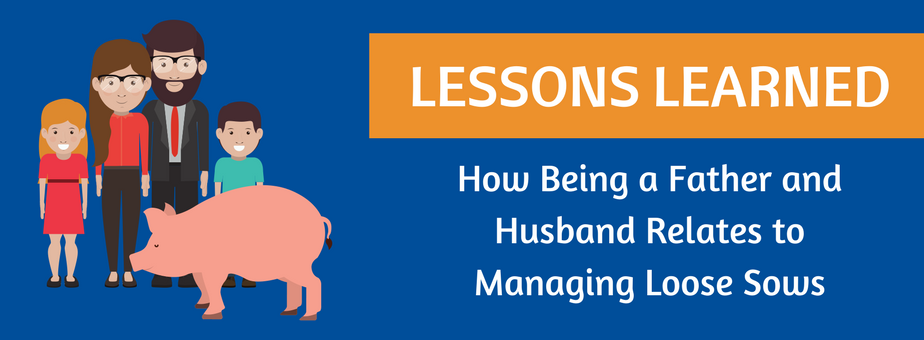
We often find overlap between our work life and our personal life. For us, and maybe for you, we see lots of connections between managing pigs on the farm and everyday life. We recently posted an article on how sows are like our in-laws, and it got me thinking about another connection I see every day - how being a good father and a good husband relates directly to successfully managing loose sow housing.
Let me first start by stating that I love my wife and kids, and in no way do I intend to compare my wife to a sow. And when I tell my kids that they are acting like pigs, it usually tends to be more of an insult to the pigs. So please read this with a sense of humour, I’ll let you know how much time I spend on the couch for writing this!
Lesson #1 – Do everything you can to keep them from getting “hangry."
I learned this one early in my relationship with my wife when I watched a very calm and caring person turn into a small version of the Hulk. Something about low blood sugar really changes her demeanor (understatement). The same is true for sows, if you are not feeding them properly or on time, you will quickly see the results. If you see increased aggression in your group, chances are you should take a look at how they are being fed.
Lesson #2 – Their personalities are unique.
I once thought that since I had a couple of relationships before I met my wife, that would help me in knowing how to interact with her and what to expect…not so apparently. What makes one woman happy can make the next one pretty upset (who knew?). In the same way, you cannot expect that each sow will react the same way when introduced into a group. Be ready to identify their unique personality traits and deal with them accordingly.
Lesson #3 – They have long memories.
Have you ever done something that your spouse didn’t like and then long after you thought it was a dead issue, it came back to haunt you? If you answered no to that, you may want to get them an MRI, there may be something wrong with their brain. It is natural for people to remember every time they have been wronged by someone or something, and the same is true of sows.
If you have an animal that is not willing to enter a feed station, chances are she had a bad experience at some point and is just reacting to her memory of that event. Conversely, I have seen animals that were trained and then returned to a stall barn for several years before they had access to an ESF again, and yet they all pretty much walked right up and into the feed station. So, to be fair, a long memory can also be a good thing.
Lesson #4 – It probably is your fault.
This one goes along with lesson #3. Get over your pride and admit that it probably was your fault. There is no point in getting mad at a sow (or your wife) for something that you clearly did, even if you don’t know yet what that was. When a sow exhibits unusual behavior there will always be a reason for it, unfortunately it then becomes your job to figure out what that reason is, with no help from her (sound familiar?).
Lesson #5 – If they aren’t keeping their area clean, guess who’s to blame?
This one I learned from my kids. When their rooms get messy, it seems that I am to blame for one of two reasons. Either I have spoiled them and given them too much junk, or I have not properly set up shelving/storage to give everything a place to go. So either way I am the one who did not enable them to keep it as clean as it should be.
Sows like to live in a clean area, so if your gestation pens are getting messy then you need to examine what you are doing wrong. It can be a variety of factors, but the most common are ventilation and stocking density (too many or too few pigs).
Lesson #6 – Training them is possible, but you will need patience.
There is no way I am referencing my wife on this one! As my kids have grown up, it appears that they are actually turning out to be good people. To me this has to be linked to the amount of patience and training they have received, and for that I have to credit my wife. Remember, when you are training your gilts that they are teenagers. And if you have been around a teenager lately (or remember being one), then you understand that how they act may not always make sense to you. They can be taught to do the right thing, but don’t expect that will happen immediately.
If you are renovating a barn and need to train your older sows…then you know what that compares to (I refuse to say it). It’s still possible to do, you will just need to use the three P’s (planning, patience, perseverance).
Lesson #7 – You get what you give.
It is truly mind-boggling the amount of joy and love my family provides me, and that only increases when I put in extra effort to provide that for them as well. The same applies in loose sow housing. If you apply yourself and give your animals respect, attention, and take care of their needs, then they will reward you. Higher production, lower stress (for you and the animals), and the simple enjoyment of caring for animals can all be yours if you start with the right attitude and put your best efforts into your barn.
Lesson #8 – Stick-to-it-ness is worth it.
I’d be lying if I said there were not moments in my marriage when it felt like it would be easier to walk away from it all. But in the end, sticking to it has allowed me to continue to enjoy life even more. There will likely be times in starting up a group sow housing barn where it seems that it is just too much. However, without exception I have seen producers come through the initial learning curve of a loose housing barn with the same reaction. I could not name one that would rather go back to stalls, and to me that says it all.





